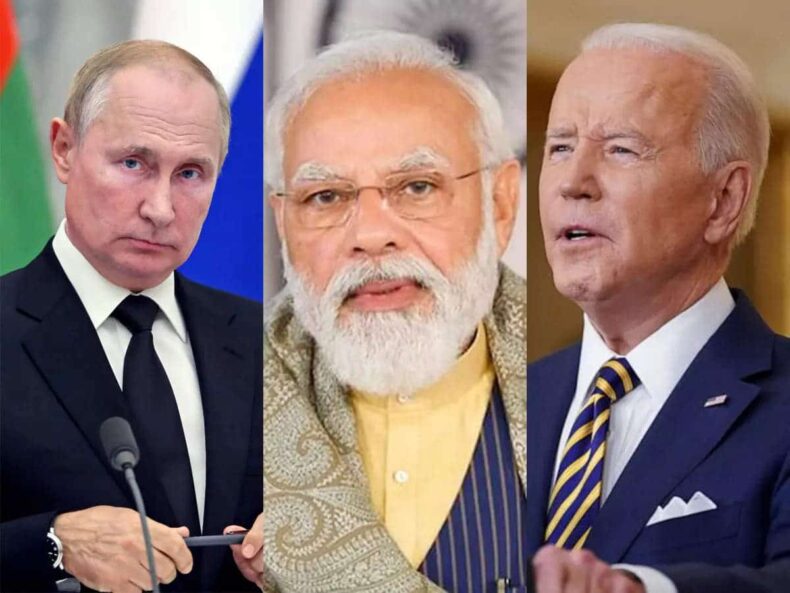Delhi, India- The US envoy in New Delhi
Said that it is a sovereign decision of countries to make given that India continues to import oil from Russia at reduced prices amid the conflict in Ukraine.
Despite the goal of Washington’s policy, the goal is to reduce revenues to Russia to fund its war,
The charge of affairs of the US embassy in New Delhi, Elizabeth Jones, stated in her first media interview since her arrival last month, on the oil cap, the goal of the policy is to reduce revenues to Russia that could be used to increase its capacities for continuing to wage war in Ukraine.
And it appears to us that it is appropriate for nations to take that into account when deciding how much oil to purchase; however, this is a sovereign decision that must be made.

India has consistently defended its decision to buy crude from Russia, claiming that it does so to satisfy its citizens’ energy needs and to reduce the inflationary effects of the Russia-Ukraine war on its people.
Jones, a career diplomat, stated regarding the conflict in Ukraine that while there are issues where the US and India concur, there are differences in the approaches taken to resolve them.
When asked about differences between the US and India regarding the conflict in Ukraine, she responded, one of the things that the US and India agree on is that we both support the rules-based international order. We both support it, and we are pleased to note how much humanitarian aid India has given to the Ukrainian people during this time when the Russians have been carrying out this vicious attack.
Jones, who worked on NATO’s role in Europe vis-à-vis Russia as the US Assistant Secretary of State for Europe and Eurasia, said that one of the hallmarks of the relationship we enjoy is the ability to have discussions about issues on which we fundamentally agree but in which the policies to get there aren’t always the same.
She responded, “I think I would point you to the kinds of statements that we have heard from our Indian colleagues to the effect that it’s none of their business,” when asked about Beijing’s objections to the US-India defense exercises near the India-China border. I’m going to stop there.
When asked about potential US-China rapprochement and its effects on India-US relations and the Indo-Pacific strategy in the wake of US President Joe Biden and Chinese President Xi Jinping’s meeting, she responded,
Also Read: Biden to talk to PM Modi in the virtual meeting about Russia War
“I wouldn’t look at this as a way to worry about the US-India relationship or US attitudes toward the Indo-Pacific.”We are as dedicated as ever to achieving our objectives in the Indo-Pacific region. Speaking with China also makes it simpler to comprehend the scope of the commitments that would be most fruitful.
She emphasized the close defense ties between India and the US and stated, Our involvement is in assisting India’s attempts to grow more competent and to guarantee that its abilities are oriented in aspects that they believe is essential. We are available to assist, but it is up to the Indian leadership to decide what it needs and wants.

The United States views the relationship with India and our relationship with Pakistan as two completely separate policies; neither is dependent upon or related to the other, according to Jones, who was deputy chief of mission at the US embassy in 1988 when Pakistan President General Zia-ul Haq and the then-US ambassador to Pakistan died in a plane crash.
The international community has shared concerns about terrorism everywhere, as well as any other types of security threats, health threats, threats from climate change, and things of that nature, she said in response to a question about the shared concern of terrorism coming from Pakistan.
And it is up to us to ensure that the US government and this embassy work to resolve these issues in the best multilateral and bilateral fashions possible.
The Interim US envoy attempted to allay some of the worries in Delhi regarding the possible obstacles to Indo-US relations, including the Ukraine War, China-US Engagement, People-to-People Contact, and India’s internal problems.
We are very energized by India taking over as the president of the G-20, she said about its assumption of the position. And I say that because I believe it shows the world community India’s ability to lead in a very complicated world.
In response to questions about social issues in India, she said: One of the things about our relationship that this permits is a frank discussion about social challenges in the United States, the treatment of ethnic, racial, and religious minorities attracts a lot of attention, just as it does here.
I think we can learn from one another about how to encourage tolerant behavior among various communities. Because, our struggles and experiences in those social areas are similar, she added.
When asked if she intended to address the issue of hate speech in India, she responded, they constantly talk regarding this with Indian workmates. One advantage of our consequential relationship is that we can discuss a wide range of topics, including simple and complex ones, as well as those on which we agree and disagree. So, yes, we have been talking about this for a while and will keep talking about it.
Regarding visa delays, she said there are challenges due to the protracted wait times for visa appointments. She claimed that the pandemic was to blame for this issue.
I can guarantee you that this is a very serious issue on the top of the minds of my colleagues in Washington, she said, highlighting the fact that recruitment and training are currently taking place for visa officers. And a significant amount of work is being done to find a solution.













